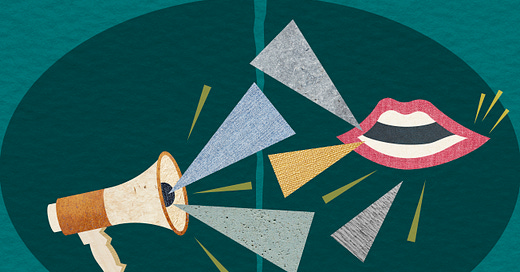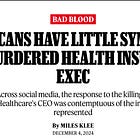It's Not Really About Glennon
How a popular writer became a proxy for the fear and frustration people feel living in a merciless hyper-capitalist system
The uber bestselling author, cultural force, and friend of Oprah, Glennon Doyle, did not receive a universally warm welcome when she recently arrived on Substack with a splash and immediate paywalls.
While it's easy to write off the backlash that ensued as a silly online controversy, it's more than that. It’s a microcosm of what is happening in the broader culture.
It offers another data point — the most extreme of the latter being the shocking support Luigi Mangione received for gunning down a healthcare executive — that suggests we are moving toward a breaking point in our culture due to the metastasizing chasm between the haves and have-nots.
In what felt like minutes, Glennon received the coveted orange check-mark that indicates a writer has over a thousand paying subscribers—a minimum of $50,000 a year—just for existing on the platform.
Writers on Substack churn out work weekly or multiple times a week for years to reach this kind of income, and others fall beneath this threshold despite being established, even bestselling, authors. Many of them have been expressing concern about wealthy and famous people with already large platforms joining Substack and siphoning off paying subscribers that are integral to the livelihood these writers.
With Glennon’s arrival, it seemed to reach a breaking point.
At the same time this controversy was occurring, another friend of Oprah, Gayle King, was receiving her own backlash for her joyride to space, accompanied by other rich and famous women who would later be shocked to learn that people who are mired in medical and/or educational debt and can't afford a home, or, in some cases, food, weren't excited about a zillion dollars being spent on an 11-minute trip to space.1
People are fed up with a tiny group of people consuming an outsized share of the resources while the majority of the population is forced to fight for the leftover scraps.
One comment about the Glennon backlash I saw spoke to this sentiment:
My issue with [Glennon Doyle] and other celebrity writers/actors/etc. showing up on Substack is akin to my issue with Target/Walmart/Amazon eliminating small independent shops by their very existence. These people already have HUGE platforms that people throw money at. They've earned it, and I don't begrudge them their success. And yet they seem compelled to come to Substack and ask people for even more money via paid subscriptions while small time creators are struggling to get eyes on their own work.
This commenter captures the real issue: many people feel they are fighting for their existence while those who already have so much still want more with no awareness or concern for how their actions impact other people. The complaint isn’t really about Glennon per se; it’s a broader indictment of the unhinged hyper-capitalist ethos of our society.
The spiritual bypassers on Substack were insistent that the people making points like the commenter above have a “lack mentality.” That would be akin to telling a family-owned bookstore that they went out of business because they didn’t have an “abundance mindset” when they were forced to close because they couldn’t compete with a major corporation.
Many of the good capitalist citizens on Substack were claiming that anyone who was upset didn’t understand that "there is enough for everyone" and "a rising tide lifts all boats," even though we are surrounded by capsized dinghies floating next to multi-million dollar yachts.
After all, as worker productivity and revenues increased in the US, workers’ wages remained stagnant, but executive pay skyrocketed. The rising tide helped a tiny group of people and left everyone else in the dust.
The "rising tide" gave us staggering, incomprehensible income inequality.
The statement "there is enough for everyone" is true only in a technical sense. When a small group of powerful people can never be satiated—they just need more money, more fame, more attention—then what’s left over is actuallly not enough for everyone else.
What is helpful is when a person with a huge following and plenty of money comes on Substack, brings their followers, but doesn’t paywall their work. But for the most part, that’s not what is happening, because that’s not the kind of world we live in. (There are exceptions like
who has nearly 500,000 subscribers but no paywalls. He will still be able to monetize this list when he sells books, so it’s still in his interest).2The problem is we live in a world where it’s been normalized for a few people to keep amassing more and more resources, whether they need them or not and with no sense of responsibility to other people.
We live in a world where billionaires like Jeff Bezos treat their workers like garbage while sending famous friends to space. We live in a world where one of the richest families on the planet pays their workers so little that many of them are on food stamps.
But Glennon isn't Jeff Bezos or a member of the Walmart family. She also isn't responsible for what is happening on Substack.
Whatever you think of her work—I happen to like it—she is not one of the bad guys.
While she thrives in a messed-up system, she uses her privilege and platform to discuss systemic issues and speak up when marginalized people are being harmed. She is principled and vocal in her politics. Close to none of her peers use their platforms this way because it's risky, and you end up alienating your customers. I think she does this because she actually cares about people.
Glennon ended up leaving Substack, and now her fans say she was bullied off the platform and that the criticisms were driven by misogyny and envy.
If she was bullied, that is wrong.
No doubt some people were nasty, since this is an online platform after all. But the criticisms and concerns I saw, which were the most widely shared, were expressed respectfully by people who in many cases were professed fans. These were akin to the female writer's version of the song Jolene: Glennon, please have mercy; don't take away my livelihood; I can't compete with you.
In addition to the bad timing issue, I think people were so vocal about how they felt about Glennon's presence because they believed that unlike other famous people on the platform—male or female—she might hear them and empathize with their situation.
I'm not saying this is fair because it's not Glennon's job to be the stand-in for other people's fear and frustration about what is happening on Substack and in the world generally.
I'm merely underscoring the fact that we miss the point entirely if we believe that Glennon Doyle incited this backlash or that it was even about her. This was about a broken system and people coming to the end of their ropes with the strain of an inhumane hyper-capitalist system that provides next to no support for regular people but heaps it upon the few that are already doing well.
Unless cultural elites, the super wealthy and political leaders grapple with this fact we should expect many more backlashes to come.
Related
If you are tempted to blame these criticisms on misogyny and think the only rich and famous people being criticized in our culture today are women, you aren’t paying attention. And if you know me, I’m usually the first one to call out misogyny, but I really don’t think that’s what's going on in the cases I’m discussing.
Some will object that Substack needs Adam Grant to be charging because that is how Substack makes money and the platform can’t exist without hugely famous people charging for their work. But there are plenty of well known people charging and making Substack tons of money and these are people who make their living here—
, , , the journalists at and , etc—not super famous people coming in to just add to their wealth and who already have massive platforms elsewhere to promote their work. At any rate, it’s not Glennon Doyle’s job to worry about Substack’s profitability. Clearly Adam Grant doesn’t care, nor should he.








What you've articulated here is a mirror to what's been swirling in my head about not just Glennon, but so much more. You've expressed it better than I ever could.
We're reaching a threshold of sorts and Glennon unwittingly placed her finger in a societal wound she's not responsible for. That wound has spread its infection to every aspect of life, and the emotional backlash is becoming swifter and stronger.
With Substack the movement seemed to start with the sense that high- profile accounts were being recruited (particularly political / current events accounts) and are being driven upwards by the algorithm while smaller accounts struggle for every subscriber. It's sometimes hard to stay motivated here while seeing how some accounts become best sellers the week after joining up.
I see this shake-up as a phase this platform needs to get through. I certainly have no beef with Glennon, Liz Gilbert, Aaron Parnas or Jim Acosta or Michael Cohen; I read and listen to their content on occasion.
The central question for this platform is what will it evolve into? I'm hoping that it will be a place with integrity that holds space for all writers.
Thank you for your thought provoking post, Kirsten.
One of the things I really hated about this whole debacle was the whole 'lack/scarcity mindset.' While yes, theoretically, there is enough for everyone, we don't live in that world right now. And people, including many writers who make a living on Substack, are dealing with ACTUAL scarcity in their lives, so to tell people who are struggling with inflation and rising costs and prices that 'it's all in your head' was utter bs in my opinion.